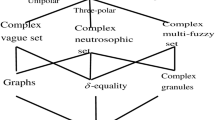Abstract
The mathematical paradigm of complex fuzzy concept lattice gives a platform to analyze the complex fuzzy attributes. The problem is addressed by several reviewers about applications of complex fuzzy concept lattice and its decomposition at user-required information granules. To resolve this problem, one of the methods is introduced using the chosen subset of attributes and properties of granulation defined for amplitude and phase term, independently. One of the real-life applications is also given for analyzing the potential manuscripts for the publications in journal based on changes in reviewer feedback at given phase of time.





Similar content being viewed by others
References
Alkouri, A.S., Salleh, A.R.: Linguistic variables, hedges and several distances on complex fuzzy sets. J. Intell. Fuzzy Syst. 26, 2527–2535 (2014)
Ali, M., Smarandache, F.: Complex neutrosophic set. Neural Comput. Appl. 28(7), 1817–1834 (2017)
Aswani Kumar, Ch., Srinivas, S.: Concept lattice reduction using fuzzy K-means clustering. Expert Syst. Appl. 37(3), 2696–2704 (2010)
Alkouri, AbD Ulazeez M., Salleh, Abdul Razak.: Complex fuzzy soft multisets. The 2014 UKM FST Postgraduate Colloquium. In: Proceedings of 2014 AIP Conference, vol. 614, pp. 955–961 (2014). https://doi.org/10.1063/1.4895330.
Burusco, A., Fuentes-Gonzales, R.: The study of L-fuzzy concept lattice. Matheware Soft Comput. 3, 209–218 (1994)
Dick, S.: Toward complex fuzzy logic. IEEE Trans. Fuzzy Syst. 13(3), 405–414 (2005)
Dick, S., Yager, R.R., Yazdanbakhsh, O.: On pythagorean and complex fuzzy set operations. IEEE Trans. Fuzzy Syst. 24, 1009–1021 (2016)
Ganter, B., Wille, R.: Formal Concept Analysis: Mathematical Foundation, p. 1999. Springer, Berlin (1999)
Goguen, J.A.: L-fuzzy sets. J. Math. Anal. Appl. 18, 145–174 (1967)
Ghosh, P., Kundu, K., Sarkar, : Fuzzy graph representation of a fuzzy concept lattice. Fuzzy Sets Syst. 161, 1669–1675 (2010)
Li, C., Chan, F.T.: Knowledge discovery by an intelligent approach using complex fuzzy sets. Lect. Notes Comput. Sci. 7196, 320–329 (2012)
Li, J.H., Mei, C., Lv, Y.: Knowledge reduction in real decision formal contexts. Inf. Sci. 189, 191–207 (2012)
Lindig, C.: Fast concept analysis. In: Ganter, B., Mineau, G.W. (eds.) ICCS 2000. LNCS, vol. 1867, pp. 152–161. Springer, Heidelberg (2000)
Singh, P.K., Aswani Kumar, Ch.: A method for decomposition of fuzzy formal context. Procedia Eng. 38, 1852–1857 (2012)
Singh, P.K., Gani, A.: Fuzzy concept lattice reduction using Shannon entropy and Huffman coding. J. Appl. Non Classic Logic 25(2), 101–119 (2015)
Singh, P.K.: Complex vague set based concept lattice. Chaos Solitons Fractals 95, 145–153 (2017a)
Singh, P.K., Aswani Kumar, Ch.: Concept lattice reduction using different subset of attributes as information granules. Granul. Comput. 2(3), 159–173 (2017b)
Singh, P.K.: Complex neutrosophic concept lattice and its applications to air quality analysis. Chaos Solitons Fractals 109, 206–213 (2018a)
Singh, Prem Kumar, Selvachandra, G., Aswani Kumar, Ch.: Interval-valued complex fuzzy concept lattice and its granular decomposition. Adv. Intell. Syst. Comput. 740, 275–283 (2018b)
Singh, P.K..: Complex fuzzy concept lattice. Neural Process. Lett. (2018c). https://doi.org/10.1007/s11063-018-9884-7
Singh, P.K.: Complex vague contexts analysis using Cartesian products and granulation. Granul. Comput (2019). https://doi.org/10.1007/s41066-018-0136-z
Singh, P.K.: Bipolar \(\delta \)-equal complex fuzzy concept lattice with its application. Neural Comput. Appl. (2019) https://doi.org/10.1007/s00521-018-3936-9
Qudah, Y.A., Hassan, N.: Operations on complex multi-fuzzy sets. J. Intell. Fuzzy Syst. (2017). https://doi.org/10.3233/JIFS-162428
Ramot, D., Friedman, M., Langholz, G., Kandel, A.: Complex fuzzy logic. IEEE Trans. Fuzzy Syst. 11(4), 450–461 (2003)
Ramot, D., Milo, R., Friedman, M., Kandel, A.: Complex fuzzy sets. IEEE Trans. Fuzzy Syst. 10(2), 171–186 (2005)
Selvachandran, G., Maji, P.K., Abed, I.E., Salleh, A.R.: Complex vague soft sets and its distance measures. J. Intell. Fuzzy Syst. 31, 55–68 (2016)
Selvachandran, G., Singh, Prem Kumar: Interval-valued complex fuzzy soft set and its application. Int. J. Uncertain. Quantif. 8(2), 101–117 (2018)
Song, Y., Hu, J.: A group decision support model based on incomplete hesitant fuzzy linguistic preference relations for mine disaster rescue. Prog. Artif. Intell. 7(3), 213–224 (2018)
Tamir, D.E., Rishe, N.D., Kandel, A.: Complex Fuzzy Sets and Complex Fuzzy Logic: An Overview of Theory and Applications. Fifty Years of Fuzzy Logic and Its Applications, pp. 661–681. Springer, Cham (2015)
Thirunavukarasu, P., Suresh, R., Viswanathan, K.K.: Energy of a complex fuzzy graph. Int. J. Math. Sci. Eng. Appl. (IJMSEA) 10(1), 243–248 (2016)
Ward, M., Dilworth, R.P.: Residuated lattices. Trans. Am. Math. Soc. 45, 335–354 (1939)
Wille, R.: Restructuring lattice theory: an approach based on hierarchies of concepts. In: Rival, I. (ed.) Ordered Sets, pp. 445–470. Reidel Dordrect, Boston (1982)
Yazdanbakhsh, O., Dick, S.: A Systematic review of complex fuzzy sets and logic. Fuzzy Sets Syst. 338, 1–22 (2018)
Zadeh, L.A.: Fuzzy sets. Inf. Control 8(3), 338–353 (1965)
Zhang, G., Dillon, T.S., Cai, K.Y., Ma, J., Lu, J.: Operation properties and \(\delta \)-equalities of complex fuzzy sets. Int. J. Approx. Reason. 50, 1227–1249 (2009)
Acknowledgements
Author thanks the anonymous reviewers and editor for their valuable time and suggestions to improve the quality of this paper.
Author information
Authors and Affiliations
Corresponding author
Ethics declarations
Conflict of interest
The author declares that there is no conflict of interest.
Ethical approval
This article does not contain any studies with human participants or animals.
Additional information
Publisher's Note
Springer Nature remains neutral with regard to jurisdictional claims in published maps and institutional affiliations.
Rights and permissions
About this article
Cite this article
Singh, P.K. Granular-based decomposition of complex fuzzy context and its analysis. Prog Artif Intell 8, 181–193 (2019). https://doi.org/10.1007/s13748-018-00170-y
Received:
Accepted:
Published:
Issue Date:
DOI: https://doi.org/10.1007/s13748-018-00170-y




